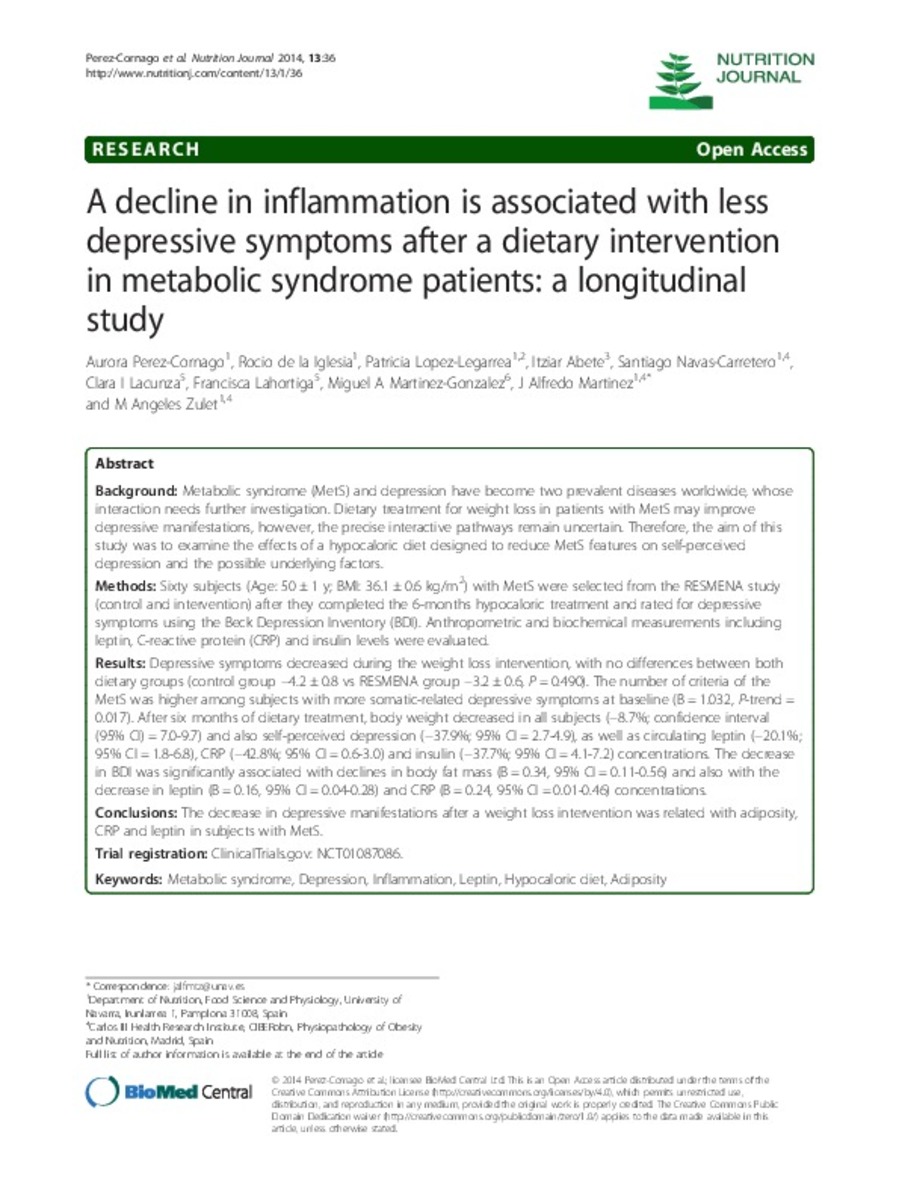Full metadata record
| DC Field | Value | Language |
|---|---|---|
| dc.creator | Perez-Cornago, A. (Aurora) | - |
| dc.creator | Iglesia, R. (Rocío) de la | - |
| dc.creator | Lopez-Legarrea, P. (Patricia) | - |
| dc.creator | Abete, I. (Itziar) | - |
| dc.creator | Navas-Carretero, S. (Santiago) | - |
| dc.creator | Lacunza, C.I. (Clara I.) | - |
| dc.creator | Lahortiga, F. (Francisca) | - |
| dc.creator | Martinez-Gonzalez, M.A. (Miguel Ángel) | - |
| dc.creator | Martinez, J.A. (José Alfredo) | - |
| dc.creator | Zulet, M.A. (María Ángeles) | - |
| dc.date.accessioned | 2014-05-12T11:35:44Z | - |
| dc.date.available | 2014-05-12T11:35:44Z | - |
| dc.date.issued | 2014 | - |
| dc.identifier.citation | Pérez-Cornago A, de la Iglesia R, López-Legarrea P, Abete I, Navas-Carretero S, Lacunza CI, et al. A decline in inflammation is associated with less depressive symptoms after a dietary intervention in metabolic syndrome patients: a longitudinal study. Nutr J 2014 Apr 24;13(1):36 | es_ES |
| dc.identifier.issn | 1475-2891 | - |
| dc.identifier.uri | https://hdl.handle.net/10171/35845 | - |
| dc.description.abstract | BACKGROUND: Metabolic syndrome (MetS) and depression have become two prevalent diseases worldwide, whose interaction needs further investigation. Dietary treatment for weight loss in patients with MetS may improve depressive manifestations, however, the precise interactive pathways remain uncertain. Therefore, the aim of this study was to examine the effects of a hypocaloric diet designed to reduce MetS features on self-perceived depression and the possible underlying factors. METHODS: Sixty subjects (Age:50 +/- 1 y; BMI:36.1 +/- 0.6 kg/m2) with MetS were selected from the RESMENA study (control and intervention) after they completed the 6-months hypocaloric treatment and rated for depressive symptoms using the Beck Depression Inventory (BDI). Anthropometric and biochemical measurements including leptin, C-reactive protein (CRP) and insulin levels were evaluated. RESULTS: Depressive symptoms decreased during the weight loss intervention, with no differences between both dietary groups (control group -4.2 +/- 0.8 vs RESMENA group -3.2 +/- 0.6, P = 0.490). The number of criteria of the MetS was higher among subjects with more somatic-related depressive symptoms at baseline (B = 1.032, P-trend = 0.017). After six months of dietary treatment, body weight decreased in all subjects (-8.7%; confidence interval (95%CI) = 7.0-9.7) and also self-perceived depression (-37.9%; 95%CI = 2.7-4.9), as well as circulating leptin (-20.1%; 95%CI = 1.8-6.8), CRP (-42.8%; 95%CI = 0.6-3.0) and insulin (-37.7%; 95%CI = 4.1-7.2) concentrations. The decrease in BDI was significantly associated with declines in body fat mass (B = 0.34, 95%CI = 0.11-0.56) and also with the decrease in leptin (B = 0.16, 95%CI = 0.04-0.28) and CRP (B = 0.24, 95%CI = 0.01-0.46) concentrations. CONCLUSIONS: The decrease in depressive manifestations after a weight loss intervention was related with adiposity, CRP and leptin in subjects with MetS. | es_ES |
| dc.language.iso | eng | es_ES |
| dc.publisher | BioMed Central | es_ES |
| dc.rights | info:eu-repo/semantics/openAccess | es_ES |
| dc.subject | Metabolic syndrome | es_ES |
| dc.subject | Depression | es_ES |
| dc.subject | Inflammation | es_ES |
| dc.subject | Leptin | es_ES |
| dc.subject | Hypocaloric diet | es_ES |
| dc.subject | Adiposity | es_ES |
| dc.title | A decline in inflammation is associated with less depressive symptoms after a dietary intervention in metabolic syndrome patients: a longitudinal study | es_ES |
| dc.type | info:eu-repo/semantics/article | es_ES |
| dc.identifier.doi | http://dx.doi.org/10.1186/1475-2891-13-36 | es_ES |
Files in This Item:
Statistics and impact
Items in Dadun are protected by copyright, with all rights reserved, unless otherwise indicated.






